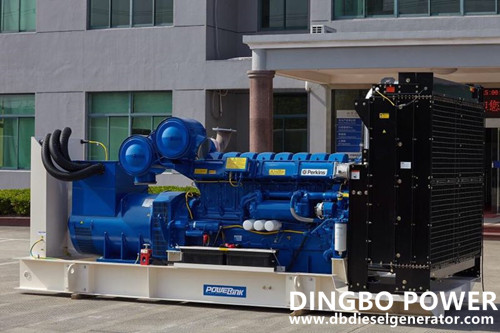dingbo@dieselgeneratortech.com
+86 134 8102 4441

- Home
- Products
- About Us
- Service
- News
- Technical Support
- Contact Us
dingbo@dieselgeneratortech.com
+86 134 8102 4441
Mar. 25, 2022
The generator set operating against power does no harm to the generator itself. But there are two caveats:
1. At this time, the generator becomes a motor, which will absorb active power from the system to maintain synchronous operation, and the excitation system does not change; However, the system frequency may decrease. At the same time reactive power to the grid, will not cause the system voltage drop, will only become dimmer operation.
2. As a turbogenerator, the main valve of the turbine has been closed when it turns into the abnormal operation state of reverse power, and the tail blade of the turbine is overheated and damaged due to friction with the remaining steam. Hazards to steam turbines. Due to the above two reasons, the harm to the steam turbine is the main. Therefore, large units should be equipped with reverse power protection. This protection mainly protects steam turbines.
Generator insulation resistance, including stator insulation resistance measurement, rotor insulation resistance measurement, bearing insulation resistance measurement, equipment connected with the generator and exciter excitation loop, etc.
Measuring method for insulation resistance of generator
Used to check whether the generator insulation is damp, dirty, mechanical damage and other problems.
1. Stator insulation resistance measurement.
The measurement wiring is shown in Figure 1. For motors rated higher than 1000 volts, use a 2500 volt megohmmeter to measure insulation resistance for 15 and 60 seconds and calculate absorption rates. If the insulation resistance or absorption rate is too small, add an insulation resistance measurement for 10 minutes to calculate the polarization index. For epoxy mica powder insulation, the absorption rate should not be less than 1.6, the polarization index should not be less than 1.6.
2.Measuring insulation resistance of bearing housing.
Purpose of measurement: The bearings on the exciter side are usually insulated from the ground in order to prevent the current between the shaft voltage and the bearing from burning out the bushing due to the asymmetric flux of the generator.

The typical bearing insulation structure of a turbogenerator is shown in FIG. 4. When checking the insulation of the bearing, use a 1000V megohmmeter to measure the insulation resistance of the metal gasket to the ground.Some turbogenerators use bushing insulation, each bushing leads to a measuring point, so check the insulation resistance of each bushing. Some turbogenerators do not have bearing bush measuring points and can only be checked during installation.
The thrust and guide bearings of the hydro-generator have insulation pads under each thrust pad. The insulation resistance of each bearing pad should be checked during installation. Before bearing oiling, the insulation resistance of each bearing bush should not be less than 100 mω.
When the insulation of the bearing is unqualified, in addition to checking the insulation pad, attention should also be paid to checking whether the insulation of the parts connected with the bearing, such as temperature, vibration sensor, oil pipe, etc., is normal.
Guangxi Dingbo Generator Set Manufacturing Co.,Ltd. established in 2006, is an manufacturer of diesel generator in China, which integrates design, supply, commissioning and maintenance of diesel generator set. Product covers Cummins, Perkins, Volvo, Yuchai, Shangchai, Deutz, Ricardo, MTU, Weichai etc. with power range 20kw-3000kw, and become their OEM factory and technology center.
Quicklink
Mob.: +86 134 8102 4441
Tel.: +86 771 5805 269
Fax: +86 771 5805 259
E-mail: dingbo@dieselgeneratortech.com
WhatsApp: +86 134 8102 4441
Add.: No. 10 Kechuang Road, High tech Zone, Nanning, Guangxi, China